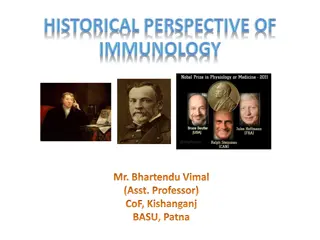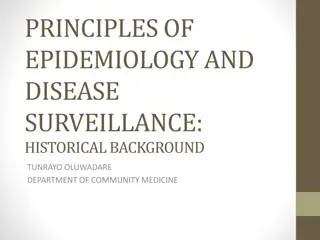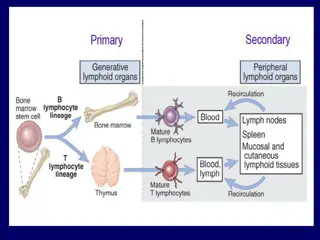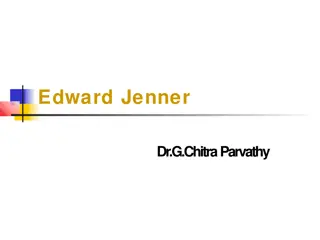Overview of Immunology: From Historical Perspectives to Modern Techniques
Immunology is the study of the immune system, its functions, and responses to various stimuli. The field traces back to ancient times, with historical figures like Thucydides and Edward Jenner contributing to its development. From innate immunity to adaptive responses, the immune system plays a cruc
0 views • 29 slides
Evolution of Ethical Principles in Medical Research: A Historical Perspective
Explore the evolution of ethical principles in medical research, from the pioneering works of Hippocrates and Edward Jenner to the post-WWII establishment of principles like voluntary informed consent. Learn about key events such as the Thalidomide scandal and the development of the Declaration of H
0 views • 10 slides
Evolution of Epidemiology: Historical Perspectives and Contributions
The evolution of epidemiology spans centuries, beginning with Hippocrates in 400 BC and progressing through key figures like John Graunt, James Lind, Edward Jenner, John Snow, and others. From the observation-based practices of ancient times to the groundbreaking experiments and analyses of the 17th
3 views • 20 slides
Immune Response Regulation and Autoimmunity Overview
The immune system maintains a balance through tolerance mechanisms to prevent autoimmunity. Central and peripheral tolerance play crucial roles in immune unresponsiveness to self-antigens. Failure in immune regulation can lead to autoimmune diseases like diabetes and lupus. Vaccination, discovered b
0 views • 18 slides
Pioneers of Immunology: Jenner, Ehrlich, and Metchnikoff
Edward Jenner initiated the concept of vaccination by discovering that cowpox could confer immunity to smallpox. Paul Ehrlich differentiated blood cells, proposed the side chain hypothesis, and pioneered serum therapy and chemotherapy. Elie Metchnikoff developed the cellular theory of immunity, advo
0 views • 4 slides
Antibiotics: Past, Present, and Future Developments in Medicine
Over the course of history, significant advancements have been made in the field of medicine regarding the understanding and treatment of infectious diseases. From key developments like immunization by Edward Jenner to the discovery of penicillin by Fleming and the subsequent development of antibiot
0 views • 30 slides
Edward Jenner: Pioneer of Smallpox Vaccine and Father of Immunology
Edward Jenner, a renowned figure in medical history, was born on May 17, 1749. He made significant contributions to immunology by developing the smallpox vaccine. His pioneering work involved inoculating individuals with cowpox to confer immunity against smallpox, a disease that was highly feared fo
0 views • 13 slides
Caitlyn Jenner: From Reality TV Star to Political Contender
Caitlyn Jenner, a former Olympic gold medalist and television personality, made headlines when she announced her bid for governor of California in 2021. Despite limited political experience, Jenner's campaign promises a fresh approach to leadership in the state. Her potential election could mark a h
0 views • 12 slides
Overview of Virus Structure and Classification
Viruses were first observed by Edward Jenner in 1798, who noticed their role in providing immunity. They are smaller than bacteria and consist of genetic material surrounded by a protein coat. Viruses are obligate cellular parasites, replicating only inside living cells. The structure of viruses inc
0 views • 38 slides








